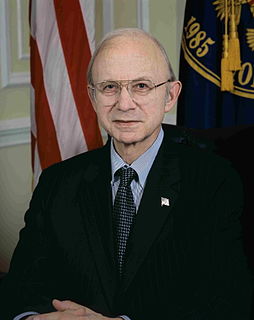A Quote by Thomas Jefferson
An enlightened citizenry is indispensable for the proper functioning of a republic. Self-government is not possible unless the citizens are educated sufficiently to enable them to exercise oversight. It is therefore imperative that the nation see to it that a suitable education be provided for all its citizens.
Related Quotes
For what is meant by saying that a government ought to educate the people? Why should they be educated? What is the education for? Clearly, to fit the people for social life - to make them good citizens. And who is to say what are good citizens? The government: there is no other judge. And who is to say how these good citizens may be made? The government: there is no other judge. Hence the proposition is convertible into this - a government ought to mold children into good citizens, using its own discretion in settling what a good citizen is and how the child may be molded into one.
No country can possibly move ahead, no free society can possibly be sustained, unless it has an educated citizenry whose qualities of mind and heart permit it to take part in the complicated and increasingly sophisticated decisions that pour not only upon the President and upon the Congress, but upon all the citizens who exercise the ultimate power.
What you do is as important as anything government does. I ask you to seek a common good beyond your comfort; to defend needed reforms against easy attacks; to serve your nation, beginning with your neighbor. I ask you to be citizens: citizens, not spectators; citizens, not subjects; responsible citizens, building communities of service and a nation of character.
The administration of private justice between the citizens of the same state, the supervision of agriculture and of other concerns of a similar nature, all those things in short which are proper to be provided for by local legislation, can never be desirable cares of a general jurisdiction . . . the attempt to exercise these powers would be as troublesome as it would be nugatory; and the possession of them, for that reason, would contribute nothing to the dignity, to the importance, or to the splendour of the national government.
A republican form of government requires four standards: It demands a highly educated population manifesting critical thinking that participates in the affairs of the nation. It requires that citizens invest in a similar moral code. It insists on a mutual ethical system abided by all. It must engender a single language whereby all citizens can discuss, debate, come to resolution and initiate mutual beneficial action for their society.
Of one man in especial, beyond anyone else, the citizens of a republic should beware, and that is of the man who appeals to them to support him on the ground that he is hostile to other citizens of the republic, that he will secure for those who elect him, in one shape or another, profit at the expense of other citizens of the republic. It makes no difference whether he appeals to class hatred or class interest, to religious or anti-religious prejudice. The man who makes such an appeal should always be presumed to make it for the sake of furthering his own interest.
[T]he delegation of the government, in [a republic], to a small number of citizens elected by the rest . . . [is] to refine and enlarge the public views by passing them through the medium of a chosen body of citizens, whose wisdom may best discern the true interest of their country and whose patriotism and love of justice will be least likely to sacrifice it to temporary or partial considerations.




























